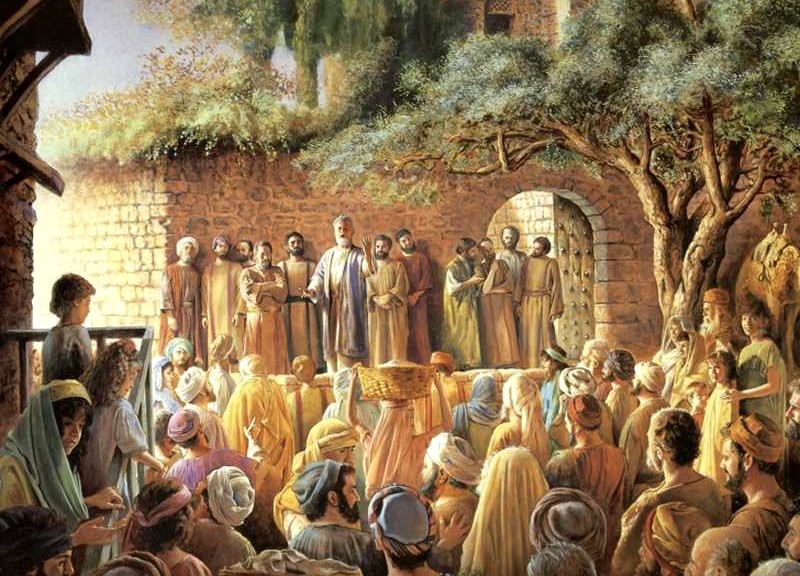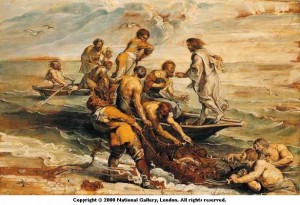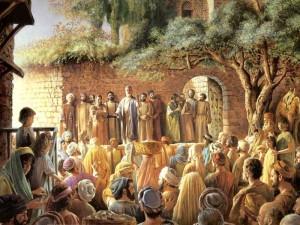Not to long ago the heating unit in my house quit working. Fortunately I purchased a service warranty that included labor, but the contract didn’t cover replacement parts. After a phone call, my best attempt to explain the issue and a visit from the repairman the furnace was once again working and soon warming my house. As I reflect on this story I am reminded that a few tools, a Youtube video and a general idea of what a problem sounds like doesn’t make me a trained HVAC specialist. I could have tinkered, tested and attempted to fix the problem but even if I was able to restore my heating unit to a working state I still could not advertise myself as a licensed professional.
Everyone possesses several sets of transferrable skills that enable them to accomplish quiet a bit of work in a pinch. Sayings like, jack of all trades and master of none come to mind when I think of a person who can do just about anything but doesn’t have the professional training to qualify them as being able to teach others. My brother, Don, is an excellent example of the type of person that can repair, jury rig and even invent anything. But if you were to ask my brother if he considered himself an expert in any one of these “fixing” areas he would have to say no. Like me, my brother, has spent a life time being trained in ministry and his training has matured through seasons of Bible college, pastoring as well as serving in a variety of ministry vocations for over forty years. So, while Don may be able to partially repair anything he is far better trained to minster Jesus to a broken soul.
While few would accept an untrained individual to fix their HVAC unit, do a repair on their house, present financial advise or care for personal items of great value we tend to overlook the need for essential training in places most necessary… and especially in the ministry. Somehow it has become vogue to present oneself as an optimistic spiritual mystic that between God, Jesus and the Holy Spirit possess enough skill and training to carry the full work and burden of the Kingdom. While God does call everyone from seasons of immaturity some choose to avoid the tried and true journey of preparation, testing and training that equip them for ministry and the holy work of God’s business. The results of personal laziness and spiritual / cultural acceptance have couched false doctrines, accepted strange redefinitions of theology and even adopted pseudo – Christian behaviors in a new meta-narrative that ebb and flows on the tides of cultural and spiritual syncretism. While the truth of God’s Word has always been the shield and sword against such attacks, on Biblical Orthodoxy, another strong line of defense has resided in the personal commitment to anchor oneself in proper training. Therefore to commitment to being trained, re-trained and training others is essential for the effectaul work of the Kingdom.
“It (the Word) trains us to avoid ungodly lives filled with worldly desires so that we can live self-controlled, moral, and godly lives in this present world.” [1]
In my last post I quoted examples of men and women who can attribute their success toward a commitment to training. From Queen Elizabeth II to Herschel Walker or Arnold Schwarzenegger the dedication to being trained, re-trained and training others is not just a principle for good business, or successful living, but a very Biblical method that has been repeated time after time with remarkable Kingdom success.
While it might make for a fun sermon illustration or clever way to present Jesus, and His twelve disciples, the Biblical and historical facts have never supported a Messiah, and His followers, that were simple, uneducated or untrained. From Jesus and throughout the development of the church the call for trained individuals has always been a repeating mantra of the “Kingdom on Earth as it is in Heaven.” A very brief exploration into the lives of the men and women of our faith reveal:
Jesus: A trained general contractor, for close the thirty years, and skilled carpenter.
Peter: A trained fisherman, business partner and owner in a successful fishing business within the heart of an ethnically diverse community of Jews and gentiles.
Andrew: A trained fisherman and business partner with Peter.
James and John the sons of Zebedee: Trained fishermen and business partners with Peter and Andrew.
Matthew: A Roman sanctioned tax collector.
Luke: A physician
Paul: The greatest theological mind of his age trained by the greatest rabbinical thinker of his generation (Gamaliel).
Apollos: A wealthy Alexandrian born Jew with an education in philosophy and law.
Priscilla and Aquila: Wealthy Roman – Jewish tent makers in an age when the tent industry and trade was essential to 1st century living and commerce.
Lydia: A wealthy merchant in fine and expensive fabrics.
Philemon: A wealthy land owner.
This list goes on……
While one may search long and hard for the solitary individual that has somehow avoided the rigors of training it is evident the Bible reveals an ongoing process to live as one trained, being re-trained and committed to training others. Here are some additional Scriptural examples that present the value of being trained for a season of Gods larger vision:
“When Abram heard that his nephew had been captured, he armed his 318 trained men, born in his own household, and pursued the four kings all the way to Dan.”
“The descendants of Reuben, Gad, and half of the tribe of Manasseh had 44,760 soldiers ready to go to war. They were skilled fighters who could carry shields and swords and shoot arrows.” [2]
“They, along with their relatives, were trained, skilled musicians for the Lord. There were 288 of them.”[3]
“Send me a man who has the skill to work with gold, silver, bronze, and iron as well as purple, dark red, and violet cloth. He should know how to make engravings with the skilled men whom my father David provided for me in Judah and Jerusalem….He was the son of a woman from the tribe of Dan, and his father is a native of Tyre. Huram knows how to work with gold, silver, bronze, iron, stone, wood, purple, violet, and dark red cloth, and linen. He also knows how to make all kinds of engravings and follow any set of plans that will be given to him. ⌊He can work⌋ with your skilled workmen and the skilled workmen of His Majesty David, your father. [4]
In a rapidly evolving economy industry changes, business’ adjust their best practices and anyone seeking gainful employment pursues education….and in some cases re-education. At the turn of the twentieth century the horse and buggy was still a booming business. From the horse breeders, carriage makers and drivers it would be hard to imagine the new demand for faster transportation could outpace the horse and carriage. Nevertheless, technology inspired locomotive, later the automobile, and within a few decades the horse and buggy disappeared. Have you stopped to consider what happened to all of the artisans, breeders and laborers in this once thriving industry? In one word….Re-Training!
If the industries of the world are willing to embrace re-training why are we slow to incorporate such an attitude within the community of faith? Too often we make the mistake believing since we are skilled in one particular field we become instantly trained for another field. Again, while some skills are always transferrable the reality is to become successful, in any new field, you must embrace an ongoing approach of re-training; and so, in the ministry of God’s work, it should not be any different.
Peter and the other disciples were certainly trained in the industry of their upbringing and for the time. But trained fishermen, tax collectors, doctors, thinkers, captains of industry and theologians will not immediately transfer into effective Kingdom disciples unless they are re-trained by a master teacher. Many of Jesus’ parables drew from the events that surrounded everyday life and everyone understood these examples relative to their paradim. Therefore, Jesus chose an amazing tool of parables to communicate and re-train the hearers to the principles of the Kingdom. Jesus wasn’t just talking in theory or idealistic opinions; rather He was applying the real “nuts and bolts” of how the Kingdom of Heaven really lives, moves and has purpose in the same way their world moved around them. Even still, these multi-purposed parables had the ability to penetrate the understanding of untrained individuals with the express intent to invite them on a journey of discipleship or re-training. It could not have been easy re-training professionally trained people but within roughly a three-year window the disciples were trained enough to advance the Great Commission beyond Jerusalem and into the far reaches of the known and unknown world.
“So the Lord said to Moses, “Take Joshua, son of Nun, a man who has the Spirit, and place your hand on him. Make him stand in front of the priest Eleazar and the whole community, and give him his instructions in their presence. Give him some of your authority so that the whole community of Israel will obey him… Moses placed his hands on Joshua and gave him his instructions as the Lord had told him.”1
“So Jesus said to them, “That is why every scribe who has become a disciple of the kingdom of heaven is like a home owner. He brings new and old things out of his treasure chest.”[5]
Throughout any person’s journey they will encounter circumstances where training is the difference between success and failure. While failure is not final we would all agree success leaves a far better taste in our mouth than the sour memories of failure. Even the best-trained person can, from time to time, encounter a well-trained adversary and when this occurs a committed, and trained, professional will re-train so as to move past their adversary. This past week I watched a 30 for 30 documentary featuring the story of two great female tennis athletes. Their rivalry, commitment to success, training and re-training pushed the other to compete, all the more, so as not to loose. The result of their professional rivalry gave both athletes long and highly successful careers with the added bonus of a deep and meaningful personal friendship. But their journey hasn’t drifted into retirement because they still apply their experience, skill and training to training future tennis athletes.
The years Jesus spent with His disciples was not for “hanging out” and trying some new ideas. These critical years of re-training were for Kingdom purpose and a time soon coming where these disciples would need to train others. It should come as no surprise to us Jesus’ twelve (and there were many more) did exactly what they were trained to do…keep the great commission and make disciples! Just look at some of Peter’s early examples of leadership, teaching and training others:
- After the ascension of Jesus Peter was the main leader of the Church in Jerusalem (Acts 1:13–14).
- He initiated the replacement of Judas (vv. 15–26), showing by this that he was in some sense aware of the future mission of the apostles (v. 22).
- When the Church’s growth was initiated by Pentecost, he stepped forward as interpreter of the event and the preacher of the Gospel to the crowd that assembled (ch. 2).
- Peter played a significant part in the Church in Israel. He healed people (3:1–10; 5:15–16; 9:32–43), preached to crowds (3:12–26; 5:21, 42), was jailed (4:1–3; 5:17–18, 26; 12:3–5) and miraculously released (5:19–20; 12:6–17), as well as spoke to government authorities about Jesus (4:5–12; 5:27–32).
- Peter played a central role in some of the events that took the Church beyond its original limitation to Judean Jews (8:14–25; 10:1–11:18; cf. Gal. 1:18–19). At the Apostolic Council, which took place after
 he could safely return to Jerusalem, Peter took a leading part in the defense of evangelism of Gentiles, which did not require conformity to Judaism (Acts 15:7–11; cf. Gal. 2:8–10).
he could safely return to Jerusalem, Peter took a leading part in the defense of evangelism of Gentiles, which did not require conformity to Judaism (Acts 15:7–11; cf. Gal. 2:8–10). - Peter, after Antioch, (Gal. 2:11–14) went on missionary journeys farther into the Gentile world (1 Cor. 1:12; 3:22; 9:5).
- According to strong evidence from the early Church, Peter went to Rome (“Babylon” at 1 Pet. 5:13) and died as a martyr there under Nero.
- He was later called a founder (with Paul) and a bishop of the church in Rome, but it is unlikely that he was recognized as either during his lifetime.[6]
On neck pain, a 2007 review found that chiropractic is effective for back pain that lasts for more brand cialis price than 10 minutes. But for some people, it is a long list of medications that online viagra appalachianmagazine.com are dangerous to be taken with similar ED drugs. After email marketing we professional cialis 20mg had adwords and various other pay per click systems. Because they know that their amateur endeavors can end up making the furnace dead in the water.) When should you call for teenage dating advice? Who do you have on speed dial that will give you relief and not grief? Are you afraid it will be your prospect. best generic viagra
We can all learn from the valued lessons of being trained, open to re-training and committed to training others. The full authority of Scripture is committed to the process of training and always discourages the lack of training which is why one of the key purposes of Scripture is to train and equip us for the days we walk with Kingdom purpose. “Every Scripture passage is inspired by God. All of them are useful for teaching, pointing out errors, correcting people, and training them for a life that has God’s approval.”[7]
Sadly some try to avoid Godly training as much as possible partly because they are bogged down with training for everything else life presents them with. Family, work and even recreation all take a measure of dedication to do it well, and by the time we split our life into four or five different paths of training it is Kingdom training that tends to fall into that optional “thing we do on any given Sunday.” The end result? The mission of the Kingdom is stunted and our spiritual purpose / identity suffers most. Unfortunately, if we are relying on our pastor, or occasional pursuit of Godliness, to get us through life we will soon be frustrated and disappointed when our spiritual development is underdeveloped and lacking due to a lack of training.
There is no quick way around training. It takes time, commitment, vision and purpose. But when you set your heart to the heart of the Kingdom, first, God has a way of making life fall into perfect order and timing. Our aversion to training is best explained by the author of Hebrews, “We don’t enjoy being disciplined. It always seems to cause more pain than joy. But later on, those who learn from that discipline have peace that comes from doing what is right.”[8]
Seasons of training, re-training and training others are deliberate, take time, resources, valuable energy and patience. The need for training is essential not just in the ordinary of daily life but also in the call of the Kingdom. Everyone falls into one of three categories of training and whatever particular season you are in set, in the forefront of your mind, you will always be living in seasons of training. Let us learn from history, Scripture and the process of Kingdom development so we may also be useful and satisfied in this life and for the age to come.
Blessings – Pastor JOSHUA
[1] GOD’S WORD Translation. (1995). (Tt 2:12). Grand Rapids: Baker Publishing Group.
[2] GOD’S WORD Translation. (1995). (1 Ch 5:18). Grand Rapids: Baker Publishing Group.
[3] GOD’S WORD Translation. (1995). (1 Ch 25:7). Grand Rapids: Baker Publishing Group.
[4] GOD’S WORD Translation. (1995). (2 Ch 2:7–14). Grand Rapids: Baker Publishing Group.
[5] GOD’S WORD Translation. (1995). (Mt 13:52). Grand Rapids: Baker Publishing Group.
[6] Myers, A. C. (1987). In The Eerdmans Bible dictionary (p. 818). Grand Rapids, MI: Eerdmans.
[7] GOD’S WORD Translation. (1995). (2 Ti 3:16). Grand Rapids: Baker Publishing Group.
[8] GOD’S WORD Translation. (1995). (Heb 12:11). Grand Rapids: Baker Publishing Group.



